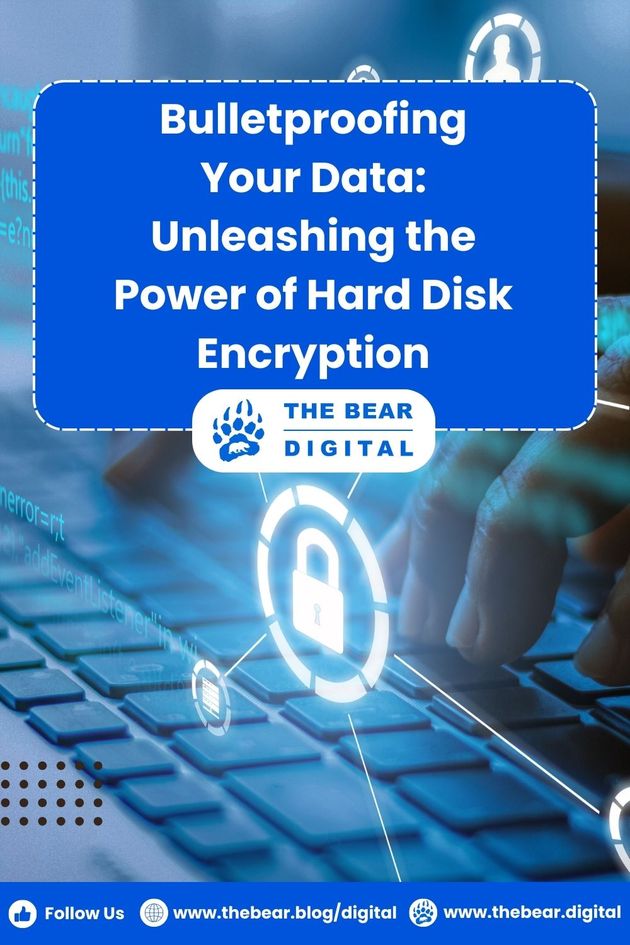Bulletproofing Your Data: Unleashing the Power of Hard Disk Encryption
In today's digital era, safeguarding sensitive data is of utmost importance. Encrypting your hard disk is a potent defense against potential threats such as data breaches, cyberattacks, and unauthorized access. These risks pose significant dangers to both individuals and businesses.
By implementing hard disk encryption, you establish a robust layer of protection that can effectively thwart these threats, ensuring the confidentiality and integrity of your valuable information.
So, unlock a new level of data security with hard disk encryption. Keep your sensitive information safe from prying eyes and potential threats. Discover the power of encryption today!
Why Use Hard Disk Encryption?
In today's dynamic business landscape, organizations face many threats to their data, amplified by the surge in cyber threats, a 400% increase during the pandemic, and the growing mobility of the workforce. With laptops being the primary computing device for many, the risk of loss or theft is substantial.
The following are the main reasons why we should use hard disk encryption today:
- Data Security
- The core objective of implementing hard disk encryption is to fortify file protection by transforming sensitive data into an unreadable format.
- Utilizing complex mathematical functions, encryption converts data into cipher text, accessible only with the appropriate encryption key or password.
- This additional layer significantly diminishes the risk of unauthorized access, ensuring data security while allowing normal functionality for common applications.
- Protection Against Theft
- The portability of laptops makes them susceptible to theft.
- Even in a theft, encrypted data remains inaccessible without the encryption key or password, acting as a potent deterrent.
- This ensures that personal, financial, and confidential data stays secure, thwarting unauthorized access.
- Compliance with Data Protection Regulations
- Various data protection regulations, such as PCI, HIPAA, or GDPR, may apply depending on your business and geographical location.
- Implementing hard disk encryption aids in meeting legal obligations, safeguarding sensitive data, and mitigating potential penalties or legal consequences.
- This is specifically crucial for compliance with regulations like HIPAA or GDPR.
Pros of Hard Disk Encryption
#1 Enhanced Confidentiality
Encrypting your hard disk establishes an additional layer of privacy, crucial for safeguarding personally identifiable information, even trade secrets, financial data, and any other confidential information.
#2 Peace of Mind
Having encrypted and secure data provides peace of mind, which allows you to focus more on your tasks without worrying about data security, especially when working in public areas or on the go.
#3 Ease of Use
Modern operating systems and software have simplified hard disk encryption. User-friendly interfaces and step-by-step instructions make the encryption setup accessible even for non-technical users, with minimal impact on performance.
#4 Protection from Data Breaches
Hard disk encryption offers a robust defense against potential data breaches due to theft or unauthorized access. Even attempts to extract the hard disk from a stolen device are stopped, as the encryption renders the data unreadable without the encryption key.
💻 Tech Trivia!
Some disk encryption software employs on-the-fly encryption (OTFE), a real-time encryption approach that adds more security to data protection.
Cons of Hard Disk Encryption
Securing sensitive data is crucial. Hard disk encryption is an effective security measure, ensuring data remains protected despite potential threats.
While it offers substantial protection, it's essential to acknowledge the potential drawbacks. Understanding these cons provides insights into the trade-offs associated with implementing this level of security.
#1 Performance Impact
One notable consideration within hard disk encryption is the impact on performance. Despite advancements in encryption algorithms designed to minimize performance degradation, there is a slight impact on system performance. This is often attributed to encrypting and decrypting data, which requires additional processing power.
Consequently, users may experience a marginal increase in boot-up times and file access speeds. However, it's crucial to emphasize that the overall performance impact remains remarkably minimal. The consensus within the field is that the added layer of security provided by encryption generally outweighs the minor inconvenience in performance.
#2 Password Management
The introduction of hard disk encryption brings forth the necessity for effective password management. Users must employ a password or encryption key to access their encrypted data. This highlights the pivotal role of password management.
Ensuring the security of the encryption key becomes paramount, as losing or forgetting the password can lead to the inaccessibility of valuable information. Adopting strong and unique passwords is crucial to mitigate this issue. Leveraging password management tools can offer additional protection by securely storing and retrieving encryption keys. This approach definitely minimizes the risk of loss due to forgotten or misplaced passwords.
Types of Encryption Technologies
Full Disk Encryption (FDE)
Full Disk Encryption is a comprehensive technique that encrypts the entire hard disk, ensuring the protection of all stored data. This inclusive approach covers every bit of data, including the operating system and applications, making it unreadable without the appropriate decryption key in the event of theft or unauthorized access.
It's important to note that the section of the disk required for booting is typically left unencrypted. FDE provides a high level of security against physical theft and unauthorized access to sensitive information stored on the hard disk.
Column-level Encryption
Column-level Encryption enhances data security within databases by adding an extra layer of protection to specific data columns. Instead of encrypting an entire database or table, this method focuses on encrypting individual columns containing sensitive information.
Organizations can designate which data requires heightened security, ensuring that even if unauthorized users access the database, they cannot decipher the encrypted content without the correct decryption key. This approach is particularly beneficial for safeguarding sensitive information like personally identifiable data (PII), ensuring specific data fields remain confidential.
File-level Encryption
File-level Encryption targets individual files or folders rather than encrypting the entire disk or database. It offers flexibility by allowing users to encrypt specific files or folders containing sensitive information. Encryption can be implemented at the operating system level or through applications.
This method is suitable for scenarios where only certain files require encryption, leaving the rest of the system unaffected. Users can manually encrypt files, adding an extra layer of security for selected data without encrypting the entire storage medium.
💻 Tech Fact!
It's worth noting that data encryption extends beyond software-based solutions.
In a reality where the theft of portable devices is unfortunate, implementing hard disk encryption becomes an invaluable layer of protection. The advantages of hard disk encryption, particularly in the context of stolen devices, cannot be overstated.
Securing your data through encryption guarantees the safety of your private information, intellectual property, and personal data from prying eyes. Embracing the power of encryption empowers you to take control of your data's security, providing not only peace of mind but also a heightened sense of privacy in an increasingly interconnected global landscape.



















